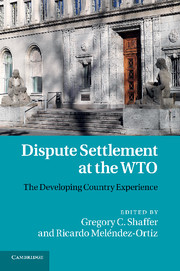Introduction
Published online by Cambridge University Press: 07 September 2011
Summary
Over its first fifteen years of operation, the World Trade Organization (WTO)'s Dispute Settlement Understanding (DSU) has assumed a central role in the enforcement and implementation of WTO commitments. The DSU provides a singularly effective mechanism by which WTO Members can seek the full implementation of previously negotiated trade concessions. Yet WTO Members are not equally positioned to access and effectively utilize it, affecting developing countries in particular.
Analysing how developing countries have used the DSU, however, is not straightforward. For a start, a number of studies in this area address the definitional question of what constitutes a ‘developing country’ as the WTO system leaves the term undefined, so that members self-determine their status. In addition, when turning to statistics to aid in the analysis, the questions multiply. Precisely when does a ‘dispute’ arise – when consultations are requested, or only after they have failed? How do we count multiple disputes on essentially the same matter? Should we focus on consultations initiated, panels established, or Appellate Body Reports adopted? How do we measure whether a case has been ‘won’ by a complainant, or whether a ruling has been fully implemented by a respondent? For the purposes of this Introduction, a dispute is regarded to have been initiated when DSU consultations are requested.
With these caveats in mind, however, it is useful to consider the following:
in fifteen years of dispute settlement under the DSU, over 400 disputes were initiated;
no African country has ever initiated a dispute under the DSU;
only one Least Developed Country (LDC) initiated a dispute, and that dispute did not progress beyond the consultation phase (Bangladesh); and
[…]
- Type
- Chapter
- Information
- Dispute Settlement at the WTOThe Developing Country Experience, pp. 1 - 18Publisher: Cambridge University PressPrint publication year: 2010



